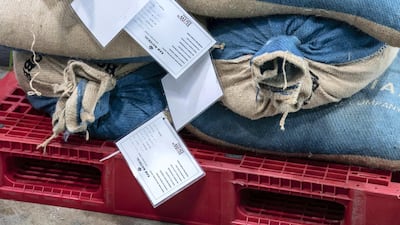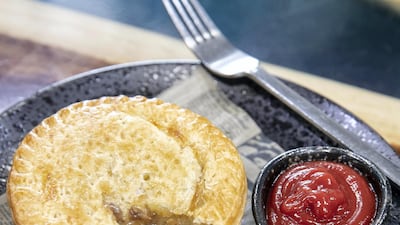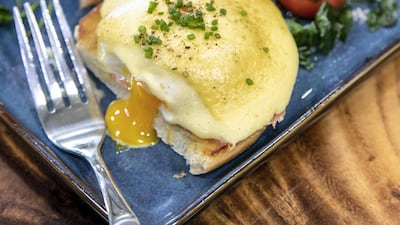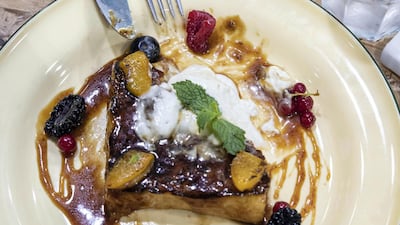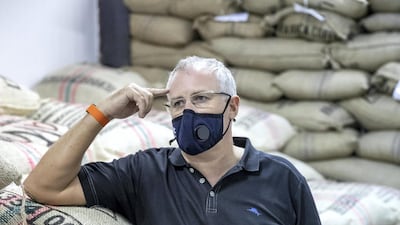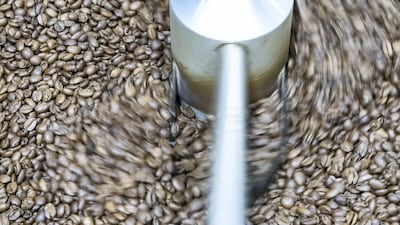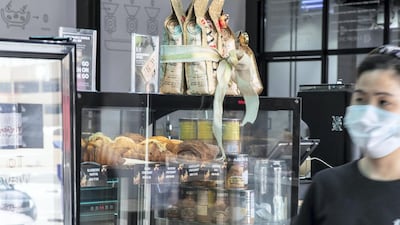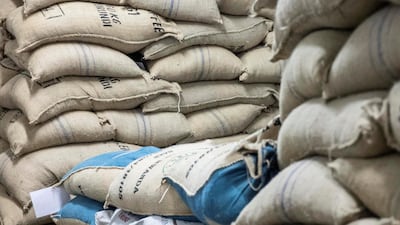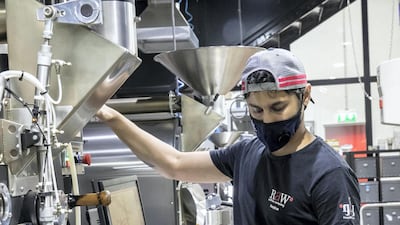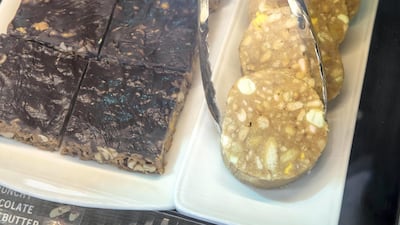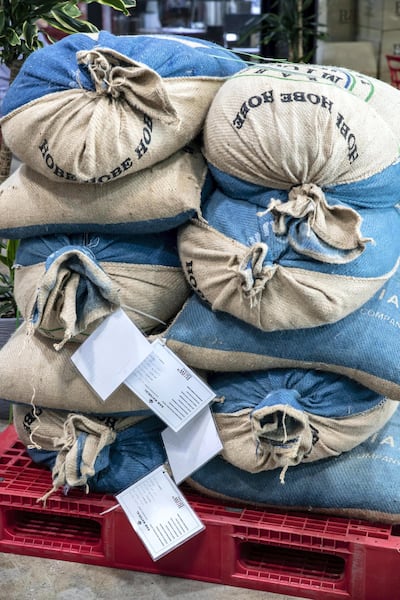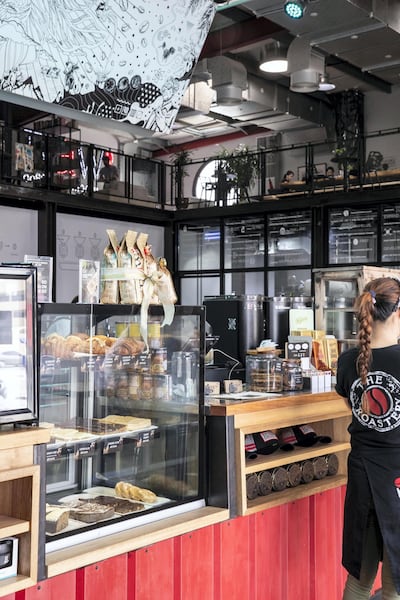As I sit down in Raw Coffee Company, a roastery and cafe in a warehouse in Al Quoz, a barista asks what kind of coffee I would like. "Americano," I say. "How would you like it?" she asks. It's a question I'm not sure how to respond to. "Black?"
She smiles and begins to list the various roasts, origins and taste compositions. "These things matter," she says. My indecision clear, she adds: "You know what, I got you." Soon, I'm sipping on one of the tastiest cold brews I've ever had. With little to no acidity to murk the flavour, I can taste roasted almonds and hints of a sweet fruit.
“That is a Rwandan blend,” Matt Toogood, chief executive and co-owner of Raw Coffee Company, says, as he approaches my table. “We experimented for weeks. It reached a point where I was ready to scrap the cold brew entirely off our menu if we did not get it just right.”
Toogood knows coffee. He knows how to source, store, roast and brew it. He has travelled everywhere from Colombia to Ethiopia and Yemen, bringing back organically certified and ethically sourced coffee beans, roasting them in small batches and distributing them to establishments around the UAE. Along with his business partner, Kim Thompson, who is the company's co-owner and managing director, Toogood is seen as the trailblazer of Dubai's new coffee culture, something that has only begun to take shape in the past decade.
Thompson started the company in 2007, opening its first branch in Dubai Investments Park before moving to Dubai Garden Centre on Sheikh Zayed Road within a year, which is when Toogood came on board.
“We basically had two rooms in the Garden Centre,” Toogood says. “That was our space. One of them was the roastery and the other was where we served customers. We had a container at the back where we used to store the coffee. It was also our office.”
When Toogood first arrived in the UAE from New Zealand in 2008, there was not much of a speciality coffee culture. Most notions of coffee revolved around Turkish and Arabic variants, as well as whatever global chains such as Costa or Starbucks were serving.
“I arrived here and did not realise there was no coffee,” Toogood recalls. “I remember going to Spinneys one day and there was a can of Illy and it was nine months old.”
Toogood and Thomspon began asking friends who were coming through Dubai to "please bring coffee, as much as you can fit in a bag".
“We had friends coming in from New Zealand, Australia and the UK just bringing roasted coffee for us,” Toogood says.
This issue presented an opportunity for Raw. "All we had to do was say, 'here, try this' and people would go 'wow'. And back then, the only thing that distinguished us was the fact our coffee was fresh."
And coffee needs to be fresh, Toogood says. “It does not need to be roasted and drunk the next day, that is a fallacy. In fact, some types need some time to relax after roasting. But typically, when you import a product, by the time it gets here, it is stale.”
While Dubai's coffee scene has changed considerably in the past decade, with speciality coffee stores now open across the city, Toogood says things are still evolving. "Three years ago there used to be 13 roasteries in the UAE. Now there are more than 50."
But they are not all equal, he says. “One common thing I see are baristas who do not drink coffee. That is like a chef who does not try their own food. How would they know it’s good?”
Another thing that is often overlooked is an ingredient that can make or break the quality of the coffee being served. Water. “Your cup of coffee is 99.8 per cent water,” Toogood says. “So if you can’t get the water right, then you will not get the coffee right. Some of our [restaurant and cafe] customers call us and say they can not seem to get the coffee to taste right. Others call and say that their coffee machine has been wrecked months after they bought it new.”
The reason for their complaints, Toogood says, is the quality of water being used. Water in the UAE contains chloride, and while the electrolyte is safe for consumption, it can damage the steel in coffee machines. Too much of it can also adversely alter coffee’s taste composition.
This is why Toogood built his own water treatment plant: through a reverse osmosis process, the high amounts of chloride found in local water are reduced, and then he adds minerals such as calcium, magnesium and potassium.
“Now I’m releasing that for my customers in a smaller version,” he says, showing me the water plant in the upstairs corner of the cafe. “But I’m not selling it. I’m going to make it part of our package. We will supply you the coffee, we will train your staff, we will supply your equipment and we will make sure you are using the right water.”
Besides training baristas, the company also has courses that cater to home users, teaching the core technical skills and knowledge required to produce coffee brewed at home.
Now the company has branched out to serve food cooked in-house, and the inspiration comes from meals Thompson and Toogood would eat at home in New Zealand.
“We are proud to be a Dubai business; we love living here,” Toogood says. “But we realised we never really highlight the fact that we are from New Zealand. We were having an online meeting a few months ago, and I said how nice it would be to have a Kiwi cafe in Dubai. How nice it would be have a pie. And Kim said, ‘Yeah, that would be great.’ So we agreed to give it a go.”
Toogood called a friend of his – a professional chef at a hotel in Dubai – and asked for some advice, and then he put together a team.

"They had never cooked Kiwi food before. We told them not to use oil apart from to fry or using olive oil as a dressing. They asked us what they were going to use instead."
Butter. New Zealand butter, Toogood says. “It sounds really simple but it changes the flavour completely. We actually have melted butter used as a dressing for certain dishes. We have an eggs benedict that is completely drenched in Hollandaise sauce. We have a fish and chips called ‘fush and chups’. Kiwi pies with pepper steak or butter chicken. A ‘naughty French toast’. And in our fridge by the counter are lolly cakes and desserts that are our grandmothers’ recipes.”
Toogood says he was "blown away" by the reception to the new menu, particularly from Kiwis and Aussies. He said they soon began receiving large orders for home deliveries. "One weekend, a woman calls me up – I have no idea where she got my number from – but she calls and asks for 50 pies. She was having a get-together with friends to watch rugby and wanted to serve pies."

After I have gorged on some pepper steak pie and naughty French toast, Toogood notices my slightly unfocused expression and chuckles before asking the barista for the Burundi espresso.
“We are at risk of over-caffeinating you,” he says. “But we still have to take a tour of the roastery.”
